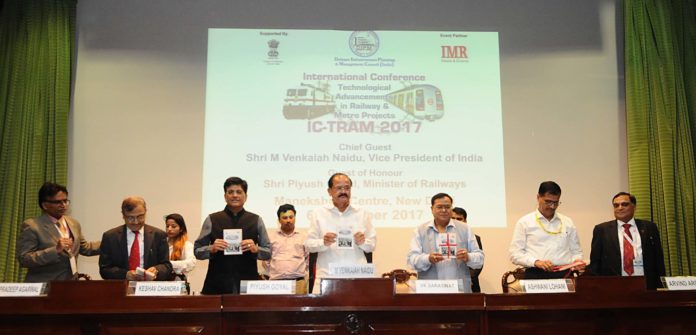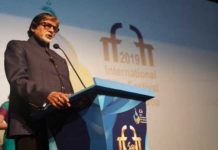The Vice President of India, Shri M. Venkaiah Naidu has said that the ongoing discussion on Economy in the country is good for democracy. He was addressing the gathering after inaugurating the International Conference on Technological Advancements in Railway & Metro Projects 2017, here today, organized by the Defence Infrastructure Planning & Management Council, the Ministry of Railways, the Ministry of Urban Development and the Niti Aayog. The Union Minister for Railways and Coal, Shri Piyush Goyal, the Chairman, Railway Board, Shri Ashwani Lohani and other dignitaries were present on the occasion.
The Vice President said that any transformation or reformation will have hiccups in the initial stages. He further said that revolutionary taxation and reformation is taking place in the country.
The Vice President quoted the World Bank President, Mr. Jim Yong Kim, who has described the recent slowdown in economic growth in India as an aberration, which is mainly due to temporary disruptions in preparation for the GST. He went on to recall the World Bank President’s statement that this aberration will get corrected in coming months and that the GST is going to have a hugely positive impact on Indian economy. He also cited recent reports that indicated a significant increase in sales of cars, televisions and refrigerators as compared to last year showing an upswing in consumer spending.
The Vice President said that with urbanization taking place at a rapid pace in India, the need for efficient and cost-effective transport is critical in ensuring faster mobility and sustainable development. He further said that new concepts such as ‘Transit Oriented Development’ should be tried out and promoted which will improve the lives of people living around the metro stations in a big way.
The Vice President said that the Indian Railways need to plan for a massive expansion very meticulously with forward looking, efficient technologies and innovative practices currently available across the globe and adopt them to serve our country’s aspiring population. He further said that the IT revolution sweeping the world, to which India has also been a major contributor, is bound to improve the efficiencies in signaling, communications and safety and help in areas like intelligent transportation systems.
The Vice President said that in the Indian ethos, we believe that science and technology are tools to improve the quality of life and we say “Bahujana hitaya, bahujana sukhaya” implying that we aim at the good of humanity at large and also care for the happiness of the entire population on this planet. We also believe this is possible if we are open to new ideas and concepts, either home grown or from outside, he added.
The Vice President expressed his hope that the discussions and the deliberations in this two-day conference will provide a fast-track approach to build many state of the art railway systems that will improve the economy and the quality of life of people in India and the rest of the world.
Following is the text of Vice President’s address:
“I am extremely happy to address this august gathering at the inaugural session of the International Conference on Technological Advancements in Railways and Metros.
From its origin purely as a colonial project in 1853, the Indian railways has emerged today as one of the largest rail networks in the world and an important economic engine in the growth and development narrative of India. It is estimated that in the next five years the Indian Railways will be the third largest railway system in the world accounting for 10 per cent of the global market.
With its extensive network, Indian Railways caters to lower, middle and upper middle classes for both, short and long distance travelling. It also one of the largest employers in the government and generates informal employment through forward and backward linkages.
Rail historian and journalist, Christian Wolmer, in an article succinctly summed up the transformative role played by the railways. He said: “Nowhere other than India is the railway so indelibly connected with the image of the nation. Just as there is no single country on earth that has such a broad cultural, ethnic, and racial mix as India, there is also no railway system that has played and, crucially, continues to play such a fundamental role”.
The Indian Railways connects the vast country through its extensive network of 64,000 km of track covering about 8,000 railway stations and 1,00,000 bridges as well as signalling and telecom network. It provides transport services to about two crore or 20 million passengers every day. Each day, 20,000 trains criss-cross the length and breadth of India serving, in a year, a population of about 700 crore (seven billion) people and transporting more than 1,000 MT (billion tons).
With the number of passengers projected to touch thirty million in the next few years and the demand for transportation of goods also touching four million tons of freight daily in the near future, the railways are poised for a massive expansion.
I am told that investments to the tune of Rs. 8 lakh crore are planned in the next five years on various projects in the railways.
With urbanisation taking place at a rapid pace in India, the need for efficient and cost-effective transport is critical in ensuring faster mobility and sustainable development.
As part of meeting the growing transport demand in cities, several new metro rail projects are in different stages of execution, apart from those in operation at Kolkata, Delhi, Chennai, Bangalore, Kochi, Lucknow and Mumbai. Metros are under construction at Ahmedabad, Hyderabad, Nagpur, Noida, Navi Mumbai and Pune, among others. Several others are under consideration and planning. Once various metros become operational, the intra-city mobility will improve by leaps and bounds.
I also understand that new concepts such as ‘Transit Oriented Development’ being tried out will improve the lives of people living around the metro stations in a big way.
So, friends, the Indian Railways will have to plan for this massive expansion very meticulously. It will have to look for technologies and innovative practices currently available across the globe. It will have to be forward looking, efficient and adopt the state of the art technologies that serve our country’s aspirational population. Against this backdrop, this conference is very timely.
I am glad that this international conference is focusing on a host of technologies that are going to play a key role not only in improving the services but also in the safety of the commuters.
The IT revolution sweeping the world, to which India has also been a major contributor, is bound to improve the efficiencies in signalling, communications and safety and help in areas like intelligent transportation systems.
I am glad that we have amidst us the Inventor of Maglev, also called magnetic levitation train. Maglev trains are very fast trains. Maglev trains float over a guide way using the basic principle of magnetic repulsion. This technology is apparently even ahead of High Speed Railways. Recently, we have embarked on collaboration with Japan to introduce high speed, ‘bullet trains’.
I am glad that technology is being harnessed for the welfare of the common man. In the Indian ethos, we believe that science and technology are tools to improve the quality of life and we say “Bahujana hitaya, bahujana sukhaya” implying that we aim at the good of humanity at large and also care for the happiness of the entire population on this planet. We also believe this is possible if we are open to new ideas and concepts, either home grown or from outside.
The ancient visionaries in India had given expression to this receptive approach when they said: “Aano Bhadrah Kratavo Yantu Vishwathah” (Let noble thoughts come to us from all sides). We should continue to build on this commonwealth of knowledge and wisdom.
Technology will also be a potential ally for improving the safety and security and enhance the quality of passenger experience. I hope this Conference will provide some new insights in this regard drawn from the global best practices.
The managers of our railway system must use every opportunity to update their knowledge and skills. Even the best systems in the world have to constantly keep learning and doing things differently to serve the populations better.
With about eight lakh crore planned investments, opening up of FDI in rail infrastructure and implementation of GST, I am sure the Indian railways will stand to benefit particularly in the long-distance transportation in the years ahead. Technology along with managerial excellence can chart a new trajectory.
The discussion which is going on our economy is always good for our democracy. But at the same time, we need to understand the experience. If some transformation or any reformation is going on, there will be some initial hiccups. But at the end of the day, it will help. A revolutionary taxation and reformation is taking place in the country. In future there will be a very happy situation with such a massive transformation taken place in a vast country like India.
The World Bank Chief, Mr. Jim Yong Kim has said that the recent slowdown in economic growth in India as an aberration mainly due to temporary disruption in preparation for the GST. That will be corrected in coming months. He also said that the GST is going to have a huge positive impact on Indian economy.
There is a discussion going on slow-down. Sales of cars, televisions and refrigerators increased more than 15 per cent in this Navaratri and Dassehra from last year. This shows how the country is moving forward.
I take this occasion to welcome all the experts gathered here today, congratulate the organizers and wish the conference a grand success.
I do hope that the discussions and the deliberations in this two-day conference will provide a fast-track approach to build many state of the art railway systems that will improve the economy and the quality of life of people in India and the rest of the world.
I wish to conclude with a fervent wish and a prayer from the 10th chapter of the Rig Veda that emphasises how we must continue this Jnana Yagna – the churning of ideas and sharing of creative thoughts- on a continuous basis with a common objective- creating for every one the happy world we all want:
“SAMAANI VA AAKOOTIH
SAMAANI HRIDAYANI VA
SAMAANAMASTU VO MANO
YATHA VAH SUSAHASATI ”
“May our intentions and aspirations be alike, so that a common objective unifies us all”?






















